
There's been a lot of buzz lately about the usefulness of seemingly worthless pregnancy remnants, including the placenta and umbilical cord. One of the most popular uses for the umbilical cord involves storing the blood inside of it. Keeping the cord blood in a bank gives families access to the many stem cells in it, which can help treat medical issues your little one and the rest of your family may encounter down the road. But is banking cord blood really worth it?
Cord blood stem cells are valuable because they can be used in a variety of medical treatments, like regenerating healthy blood and immune cells after radiation therapy. Stem cells are the body's building blocks for blood cells, tissues, organs and the immune system. They can basically transform into any of these structures, which makes them very useful in the healing process.
Cord blood stem cells are more valuable than those found in adult bone marrow because they're much younger, can be used in a wider variety of treatments and haven't been exposed to any damaging environmental factors. Another perk? Collecting the cord blood is a simple process, and it won't harm either you or your baby. A doctor will simply draw blood from the umbilical cord or let the blood drain into a bag within 15 minutes of delivery and send it to be processed by a lab within 48 hours.
Of course, this highly impressive service isn't exactly free. An initial fee typically ranges from $900 to $2100, reports the American Pregnancy Association, and after that, an annual fee of around $100 covers the cost of keeping the blood in the bank.
So, what's the final word? Collecting the cord blood from the birth of your first child might be something to consider if your family has a history of medical issues, but otherwise you may find it's not worth the money, aside from providing you with peace of mind. You may also want to consider donating the blood, which other families can use. In the end, it's important to weigh your options and come up with a decision that's best for you and your baby.


Leave a Reply